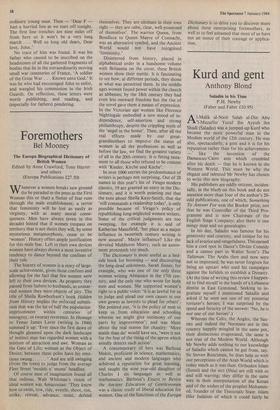Foremothers
Bel Mooney
The Europa Biographical Dictionary of British Women Edited by Anne Crawford, Tony Hayter and others (Europa Publications £27.50)
Whenever a women breaks new ground (to be paraded in the press as the First Woman this or that) a flutter of fear runs through the male establishment, a terror that femininity will be lost as easily as virginity, with as many moral conse- quences. Men have always (even in this decade) hinted that if women trespass on territory that is not theirs they will, by some mysterious metamorphosis, cease to be 'women'. History offers ample justification for this male fear. Left to their own devices women have always shown a most inventive tendency to dance beyond the confines of their role.
The history of women is a story of large- scale achievement, given those confines and allowing for the fact that few women were left to their own devices. As property they passed from fathers to husbands, as unmar- ried women they were objects of pity. The title of Sheila Rowbotham's book Hidden from History implies the enforced submis- sion that was the lot of half the population: imprisonment within centuries of misogyny, or (worse) reverence. In Homage to Venus James Laver (writing in 1946) summed it up: 'Ever since the first dawn of thought gleamed upon the dark landscape of instinct man has regarded women with a mixture of attraction and awe. Woman as the Gate of Life; woman as the Object of Desire; between these poles have his emo- tions swung ' And are still swinging (from the trees) to judge from the average Fleet Street 'models n' mums' headline.
Of course men of imagination found all that tedious. Walt Whitman's vision of ideal women was Amazonian: 'They know how to swim, row, ride, wrestle, shoot, run, strike, retreat, advance, resist, defend themselves. They are ultimate in their own right — they are calm, clear, well-possessed of themselves'. The warrior Queen, from Boudicca to Queen Maeve of Connacht, was an alternative symbol, and the Ancient World would not have recognised `femininity.'
Disinterred from history, placed in alphabetical order in a handsome volume with Britannia on the cover, these British women show their mettle. It is fascinating to see how, at different periods, they shone at what was permitted them. In the middle ages women found power within the church as abbesses; by the 18th century they had even less outward freedom but the rise of the novel gave them a means of expression. In the Victorian age women like Florence Nightingale embodied a new mood of in- dependence, self-assertion and strong philanthropy, despite the crippling myth of the 'angel in the house'. Then, after all the real efforts made by our great- grandmothers to improve the status of women in all the professions as well as before the law, we find the greatest variety of all in the 20th century. It is fitting testa- ment to all those who refused to be content with 'Kinder, Kirche and Ktiche'.
In over 1000 entries the predominance of writers is perhaps not surprising. Out of 28 names in this year's list of Virago modern classics, 19 are granted an entry in the Dic- tionary, and it is worth pointing out that the note about Sheila Kaye-Smith, that she `still commands a readership today', is only possible because of Virago's policy of republishing long-neglected women writers.
Some of the critical judgments are too sweeping, for example it is said of Katherine Mansfield, 'her place as a major influence in twentieth century writing is now assured'. Major influence? Like the devoted Middleton Murry, such an assess- ment protesteth too much.
The Dictionary is most useful as a bed- side book for browsing — and discovering the long-dead unknowns. Sarah Jinner, for example, who was one of the only three women writing Almanacs in the 17th cen- tury, and the only one who wrote for both men and women. She supported women's right to a public voice: 'it is as lawful for us to judge and plead our own causes in our own gowns as lawyers to plead for others'. She pointed out, 'it is the policy of men to keep us from education and schooling wherein we might give testimony of our parts by improvement'; and was blunt about the real reason for chastity: 'More maids than do' would have sex, 'were it not for the fear of the rising of the apron which usually detects such action'.
A contemporary of hers was Bathsua Makin, proficient in science, mathematics, and ancient and modern languages who achieved a reputation for great learning, and taught the nine year-old daughter of Charles 1 six languages as well as mathematics. Bathsua's Essays to Revive the Ancient Education of Gentlewomen was a classic study of liberal education for women. One of the functions of the Europa Dictionary is to drive you to discover more about these enterprising foremothers, as well as to feel ashamed that most of us have not an ounce of their courage or applica- tion.


































 Previous page
Previous page